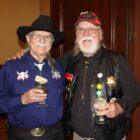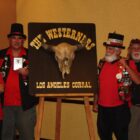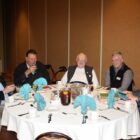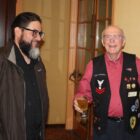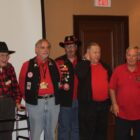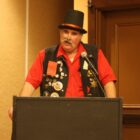Roundup: January 8 2020, ECV Night
January-2020-Roundup-ECV-Night-Final-Version
Roundup Synopsis
On E Clampus Vitus Night, fraternity members dressed in red to usher in the New Year at the first roundup of 2020. Clamper Mark Mutz took the floor to discuss the ins and outs of storytelling. Mutz uncovered the truth behind various legends about American history. He connected historical monuments of death and destruction with his experience as a curious young man in New England, an infantry sergeant from the Pacific Northwest to Kentucky, and as a resident in his current home in California. The tombstones he found throughout his life served as reminders of grim moments in the past often forgotten by the average American today—“A Soldier of the Revolution,” the Russian orthodox cemetery near Fort Richardson, Alaska, and the Civil War graveyards near Fort Campbell, Kentucky. Each marker told a story, and those stories contributed to Mutz’s endeavor to report on those stories in his newspaper, The Fence Post.
America was built on legends and continues to be spoken of in the language of these legends. The mythos surrounding the origin of Thanksgiving cracked under the pressure of Mutz’s corrections, and that same pressure challenged other popular misconceptions; the conquered Californios who fought back against American conquest with skill and bravery, as opposed to letting our country have an easy victory. Most fallacious of all, in Mutz’s eyes, would be the various paradoxes that make up America’s historic foundation. The fight for U.S. independence missed a true sense of universal patriotism as a mess of loyalism, fence-sitting, and opportunism stood in the way of unified dissent against the British. “Liberty and justice for all” applied only to a select portion of the American population for many generations. The existence of slavery and the disenfranchisement of women are two of the clearest examples of how America’s promise did not match up to reality.
How can a nation stand on so many contradictions? Mutz strives to take such contradictions apart. Their existence begs asking— does America stand because of a collective willingness to overlook errors in nationalist nostalgia? Many more factors put America in a good position to avoid discussing its checkered past, but a critical look at the historical record is necessary to stop the cycle of perpetuating a lack of awareness of our country.
— Arkaz Vardanyan


